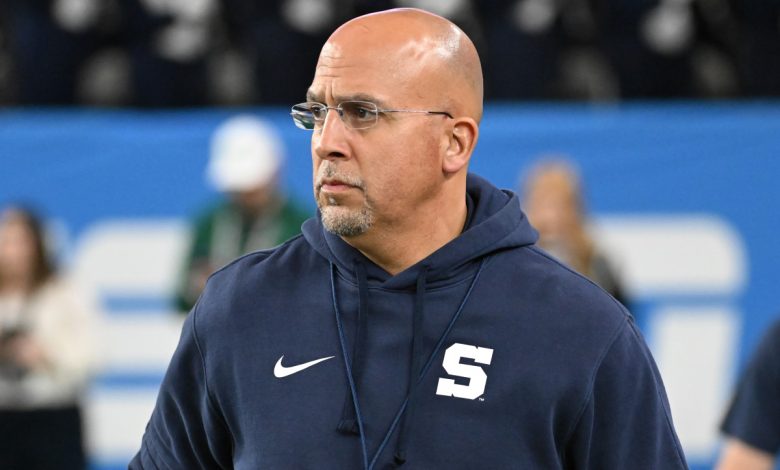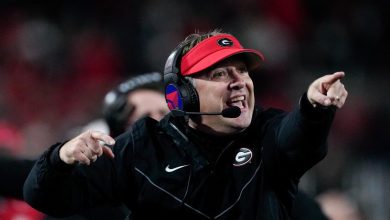James Franklin Doubles Down on Criticism of Notre Dame’s Independence, Questions Fairness in College Football Playoff Era and Scheduling Equity

Penn State head coach James Franklin has once again stoked the fires of controversy in college football, doubling down on his criticism of Notre Dame’s long-standing independent status. With the sport barreling toward a new era of realignment, expanded playoffs, and heightened emphasis on strength of schedule, Franklin has made it clear: Notre Dame’s football independence no longer fits within the modern landscape.
Franklin, speaking to reporters during Big Ten media days, reignited the debate over whether the Fighting Irish should finally join a conference full-time.
“Notre Dame has a great tradition. I respect the program and what they’ve accomplished,” Franklin said. “But when the rest of us are navigating the weekly grind of conference play, travel, and championship games, they’re playing by a different set of rules. It’s time we ask if that still makes sense.”
Related Articles
This isn’t the first time Franklin has taken aim at Notre Dame’s autonomy. But his comments come at a pivotal time: the College Football Playoff is expanding, the Big Ten and SEC have ballooned into super-leagues, and the push for equity in competition is louder than ever.
Franklin’s Argument: One Sport, One Rulebook
Franklin’s central message is about fairness. While Notre Dame plays a tough schedule annually, it is not bound to a conference. That freedom means it avoids the challenges of a conference championship game and the gauntlet of intra-conference scheduling, yet still competes for a College Football Playoff berth.
“You want to be in the Playoff? Then you should play by the same rules as everyone else trying to get there,” Franklin said. “If every other Power Five school is in a conference, Notre Dame shouldn’t be the exception.”
Franklin pointed to the expanded 12-team CFP model, where six spots go to conference champions and the remaining six to at-large teams. Under the new system, Notre Dame is ineligible for a top-four seed because it does not participate in a conference championship. Still, it remains in contention for the other spots.
“That’s a built-in disadvantage for everyone else,” he added. “You don’t have to play in a title game, but you still get a chance at the same reward.”
The Notre Dame Perspective
Notre Dame, of course, has long prided itself on being an independent football program. Its national schedule, massive alumni base, and exclusive TV contract with NBC have allowed it to thrive outside the conference model. The school’s tradition includes annual matchups with USC, Navy, and Stanford, along with frequent showdowns against ACC, Big Ten, and SEC programs.
In response to Franklin’s comments, Notre Dame head coach Marcus Freeman kept his reaction measured.
“We’re proud of who we are. We play a national schedule, compete at the highest level, and our results speak for themselves,” Freeman said. “We’re focused on football and being the best team we can be.”
Conference Coaches React
Franklin’s remarks have sparked mixed reactions within the coaching ranks. Some agree with his assessment, arguing that Notre Dame should either join a conference or face greater limitations in postseason eligibility. Others point to the difficulty of Notre Dame’s schedules as proof that they’ve earned their seat at the table.
“Let’s not pretend Notre Dame is ducking competition,” one anonymous Power Five coach told The Athletic. “They’ll play Ohio State, Clemson, Texas A&M, and USC in a season. That’s not a soft schedule.”
Still, others argue that the demands of a full conference slate and championship weekend create a distinct disadvantage for everyone else.
“James is right about one thing: the rest of us don’t get to cherry-pick. We live in a world of divisions, rivalries, and title games,” said a Big Ten assistant coach. “Notre Dame doesn’t deal with that.”
The TV and Money Factor
One reason Notre Dame remains independent is simple: money. The school’s exclusive media rights deal with NBC, valued at over $60 million annually, gives them flexibility and control few other programs enjoy. They don’t share that revenue with a conference, and they set their own national schedule.
Franklin acknowledged this reality.
“They’ve built a strong brand and monetized it well. But money shouldn’t outweigh fairness when it comes to the postseason,” he said. “What’s best for TV isn’t always what’s best for competitive equity.”
This has been a sticking point for years. While schools in conferences like the Big Ten and SEC split massive TV deals among dozens of teams, Notre Dame keeps most of its revenue in-house. That financial independence only reinforces the program’s desire to remain outside the conference structure.
History vs. Modern Reality
Notre Dame’s independence dates back to the early 1900s, a product of geography, religion, and national appeal. Over time, it became a symbol of the school’s unique identity. Even today, many Irish fans view joining a conference as betraying tradition.
Franklin doesn’t dismiss that history, but he sees it as secondary to fairness.
“Tradition is great. But the sport is evolving. If we’re going to have a real playoff and a real structure that treats everyone equally, then everyone has to be under the same umbrella.”
He continued, “It’s not personal—it’s about the future of the game.”
Playoff Seeding Could Force Notre Dame’s Hand
The College Football Playoff’s expanded format may do what peer pressure hasn’t: force Notre Dame to rethink its independence. With no chance at a top-four seed due to the lack of a conference title game, Notre Dame’s path to a national championship just got tougher.
Athletic director Jack Swarbrick, who recently stepped down, had said previously that Notre Dame would only consider conference affiliation if its independence became a true competitive disadvantage. That moment may be arriving.
Franklin, for one, believes that day is overdue.
“If we keep rewarding teams that don’t go through the same process, we’re going to lose the integrity of what the postseason should be about.”
Fan Reaction Is Split
On social media, college football fans have taken sides.
Some agreed wholeheartedly with Franklin:
“James Franklin is 100% right. Notre Dame shouldn’t get special treatment just because they’re Notre Dame.”
Others fired back:
“Notre Dame plays a tougher schedule than most Big Ten schools. Franklin needs to win his conference before complaining.”
The discourse reflects deeper tensions in the sport between tradition and progress, fairness and power, independence and conformity.
Could the Big Ten Be Notre Dame’s Future?
If Notre Dame were to join a conference, the Big Ten remains the most logical destination. The Irish have historic rivalries with Big Ten programs like Michigan, Michigan State, and Purdue. The league also offers the financial firepower and academic alignment that Notre Dame values.
Franklin would welcome it.
“They’d elevate the Big Ten. It’d be great for the league, great for the sport. But more importantly, it would put us all on level footing.”
Still, Notre Dame has resisted past overtures to join. The school values its autonomy and national identity—two things it believes would be diluted in a league setting.
What Happens Next?
The realignment dominoes continue to fall across college football. With USC and UCLA already in the Big Ten and Oregon and Washington set to join, the idea of “independence” feels increasingly out of step with reality. Franklin’s challenge is just the latest push toward cohesion.
If Notre Dame’s access to the College Football Playoff becomes more restricted—or if pressure from within the college football power structure increases—it may eventually be forced to choose: join a conference, or risk falling behind.
“We’re all adapting to this new world,” Franklin said. “The question is, will they?”
James Franklin’s pointed remarks about Notre Dame’s independence were more than just offseason soundbites. They tapped into a growing sentiment that college football needs consistency and competitive balance. While Notre Dame continues to operate in its own lane, coaches like Franklin are demanding a unified path forward.
As the College Football Playoff expands and power consolidates among super-conferences, the Irish’s once-sacred independence may face its greatest challenge yet—not from TV contracts or fan backlash, but from the shifting standards of the sport itself.
Whether Notre Dame finally joins a conference remains to be seen. But Franklin’s message is clear: it’s time to play by the same rules—or get left behind.









